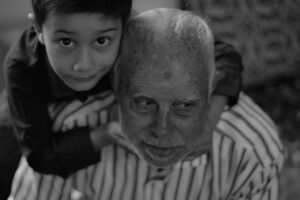Usually when I write a blog post, it is because I want to share something that is important to me, that I discovered, something that I think will help other people. But this post isn’t going to be anything like my standard posts. Instead of it being my sharing with you, it is my asking advice on a topic that I am not as well informed as I would like to be.
And though I have various Facebook groups that I’m in, ones that I joined to learn more about Autism Spectrum Disorder, now that it has been confirmed that my son, Ike, is, indeed, on the spectrum, I would rather ask my blog readers what you think, as you’ve been following my parenting journey for the past few years, where I’ve explained my viewpoint and parenting style and decisions, and I feel my readership is a community of largely likeminded individuals.
The question, specifically, is about my next step regarding my son’s Autism journey.
If you didn’t read already my post about how I explained to my children about my son’s Autism, I recommend you read it first before reading the rest of this post, as it elaborates more about where I am coming from in terms of mindset.
In the past few weeks I’ve been thinking a lot about what I want for my son, now that I have an official diagnosis.
1) What I want for him is to have as many opportunities as possible opened to him that suit him, and not have doors closed to him because of his Autism.
2) I want to give him the best shot at success in life. My definition of success specifically is that I want him to be able to be a productive member of society, in a way that suits his nature, taking into account his strengths and weaknesses. I want him to be able to have happy, healthy relationships- also with family members, also with friends and neighbors, and eventually I want him to be able to have a happy and healthy marriage and be able to be a good father one day as well.
3) And I want him to be a happy person, with self confidence, who knows he is lovable just by nature of being himself, that he doesn’t need to be someone who he is not, in order to be worthy of love and acceptance.
4) And I want my son to be intrinsically motivated, and not to need to be bribed or threatened with punishments in order to get things done.
5) And for me and the rest of my family- I want to be able to have a happy, healthy relationship with him, where we both are able to try to understand what the other is feeling, and use that as a cornerstone of building our strong relationship. And I want him to be able to do the same with his siblings.
When I mention to people about the first and seconds of my hopes and goals for my son, because of or in spite of his Autism diagnosis, many suggest all sorts of interventions. And I want to learn, because I don’t know enough about the various tools that can be used to help people with Autism have as happy and successful of a life, whether in the workforce or in relationships, as possible.
And often, I hear people recommending ABA therapy when I ask for what they suggest I do next. Because, according to officials, “ABA therapy is clinically proven to be the most effective way of helping kids with Autism.”
And I don’t judge parents for choosing to do ABA therapy, especially in cases where their child’s Autism is very severe.
But personally, after doing a lot of reading about ABA, it seems to be exactly the opposite of my parenting style. Basically, bribing and punishing a child to get them to comply with what the therapist decides is proper behavior. And sometimes, the bribes are via withholding affection until a kid earns it.
Reading this immediately throws up a bunch of red flags for me, because I am very opposed to making a child need to earn displays of love. Being loved and being shown love is something that I think is the most important thing for a child, and what gives a child the feeling that is is lovable and loved and worthwhile, and it is what builds a child’s self esteem. I don’t want to get into specifics, but I’ve seen first hand what bad things can happen when a person needs to “earn” a parent’s love.
Defenders of ABA say that you can’t argue with it’s effectivity, that it works, and its success speaks for itself. But the question is- what is success? What you see on the surface or what goes on beneath the surface? As one of the articles on ABA wrote- if you punched a kid every single time he touched something he shouldn’t, he’ll stop touching it eventually- hence it is “effective”- but does that mean you should argue that punching a kid for touching something he shouldn’t is the right way to go?
I’m not trying to change anyone’s mind about ABA, but from what I see, it goes against my parenting style/views, and I feel it would not contribute towards goals number three and four.
Here are some articles I read arguing against ABA.
https://unstrangemind.wordpress.com/2014/10/07/aba/
https://sociallyanxiousadvocate.wordpress.com/2015/05/22/why-i-left-aba/
http://ink-and-daggers.tumblr.com/post/112076858794/im-sorry-but-thats-not-earning-your-token
https://emmashopebook.com/2012/10/10/tackling-that-troublesome-issue-of-aba-and-ethics/
All these seem to pinpoint that for the reasons I mentioned above, ABA isn’t something I would choose for my kid, because I think they are counterintuitive to goals number 3 and 4.
However, I still would like my son to have as many opportunities open to him as possible, and I want him to be able to have happy, healthy relationships with people… and I will admit that something more probably needs to be done than what I am doing now. Because he does have frequent meltdowns and there is a lot of frustration going on in our house on a regular basis, also from him, and also from other family members, including myself…
But if not ABA, then what?
If there is anyone else with a similar parenting style to myself, who opted against ABA for their autistic child, what yes did you choose to do, to help your child have the greatest chance of success in life, while at the same time, not crushing him emotionally, and building up his self esteem?
Thank you.
Greatly appreciated.
And if you are someone with a parenting style similar to mine, and you decided to go ahead with ABA therapy for your child, can you elaborate why you decided to do so?
I really am at a loss; I don’t know where to go from here, and hopefully those of you who’ve been with me along my parenting journey thus far can provide some much needed insight.




0 Responses
Many thanks for this. You mentioned Singapore in your post so I assume you're currently here as well; can you please provide the name of the ABA clinic you're using? My 3 year old son was diagnosed with HFA and I'm considering floortime and/or ABA as well.